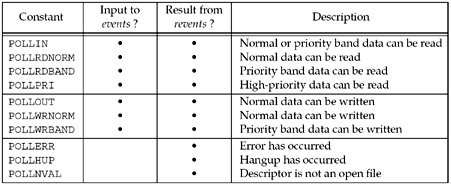6.10 poll
Function
The poll function originated with SVR3
and was originally limited to STREAMS devices (Chapter 31). SVR4 removed this
limitation, allowing poll to work with any descriptor.
poll provides functionality that is similar to
select, but poll provides additional information
when dealing with STREAMS devices.
|
#include <poll.h>
|
|
int poll (struct pollfd *fdarray, unsigned long nfds, int timeout);
|
|
Returns: count of ready descriptors, 0 on
timeout, 鈥? on error
|
The first argument is a pointer to the first
element of an array of structures. Each element of the array is a
pollfd structure that specifies the conditions to be
tested for a given descriptor, fd.
struct pollfd {
int fd; /* descriptor to check */
short events; /* events of interest on fd */
short revents; /* events that occurred on fd */
};
The conditions to be tested are specified by the
events member, and the function returns the status for
that descriptor in the corresponding revents member.
(Having two variables per descriptor, one a value and one a result,
avoids value-result arguments. Recall that the middle three
arguments for select are value-result.) Each of these two
members is composed of one or more bits that specify a certain
condition. Figure 6.23
shows the constants used to specify the events flag and to
test the revents flag against.

We have divided this figure into three sections:
The first four constants deal with input, the next three deal with
output, and the final three deal with errors. Notice that the final
three cannot be set in events, but are always returned in
revents when the corresponding condition exists.
There are three classes of data identified by
poll: normal,
priority band, and high-priority. These terms come from the
STREAMS-based implementations (Figure 31.5).
POLLIN can be defined as the logical OR
of POLLRDNORM and POLLRDBAND. The POLLIN
constant exists from SVR3 implementations that predated the
priority bands in SVR4, so the constant remains for backward
compatibility. Similarly, POLLOUT is equivalent to
POLLWRNORM, with the former predating the latter.
With regard to TCP and UDP sockets, the
following conditions cause poll to return the specified
revent. Unfortunately, POSIX
leaves many holes (i.e., optional ways to return the same
condition) in its definition of poll.
-
All regular TCP data and all UDP data is
considered normal.
-
TCP's out-of-band data (Chapter 24) is considered priority
band.
-
When the read half of a TCP connection is closed
(e.g., a FIN is received), this is also considered normal data and
a subsequent read operation will return 0.
-
The presence of an error for a TCP connection
can be considered either normal data or an error
(POLLERR). In either case, a subsequent read will
return 鈥? with errno set to the appropriate value. This
handles conditions such as the receipt of an RST or a timeout.
-
The availability of a new connection on a
listening socket can be considered either normal data or priority
data. Most implementations consider this normal data.
-
The completion of a nonblocking connect
is considered to make a socket writable.
The number of elements in the array of
structures is specified by the nfds argument.
Historically, this argument has been an
unsigned long, which seems excessive. An unsigned
int would be adequate. Unix 98 defines a new datatype for this
argument: nfds_t.
The timeout
argument specifies how long the function is to wait before
returning. A positive value specifies the number of milliseconds to
wait. Figure 6.24 shows
the possible values for the timeout argument.

The constant INFTIM is defined to be a
negative value. If the system does not provide a timer with
millisecond accuracy, the value is rounded up to the nearest
supported value.
The POSIX specification requires that
INFTIM be defined by including <poll.h>,
but many systems still define it in
<sys/stropts.h>.
As with select, any timeout set for
poll is limited by the implementation's clock resolution
(often 10 ms).
The return value from poll is 鈥? if an
error occurred, 0 if no descriptors are ready before the timer
expires, otherwise it is the number of descriptors that have a
nonzero revents member.
If we are no longer interested in a particular
descriptor, we just set the fd member of the
pollfd structure to a negative value. Then the
events member is ignored and the revents member
is set to 0 on return.
Recall our discussion at the end of Section
6.3 about FD_SETSIZE and the maximum number of
descriptors per descriptor set versus the maximum number of
descriptors per process. We do not have that problem with
poll since it is the caller's responsibility to allocate
an array of pollfd structures and then tell the kernel the
number of elements in the array. There is no fixed-size datatype
similar to fd_set that the kernel knows about.
The POSIX specification requires both
select and poll. But, from a portability
perspective today, more systems support select than
poll. Also, POSIX defines pselect, an enhanced
version of select that handles signal blocking and
provides increased time resolution. Nothing similar is defined for
poll.
|